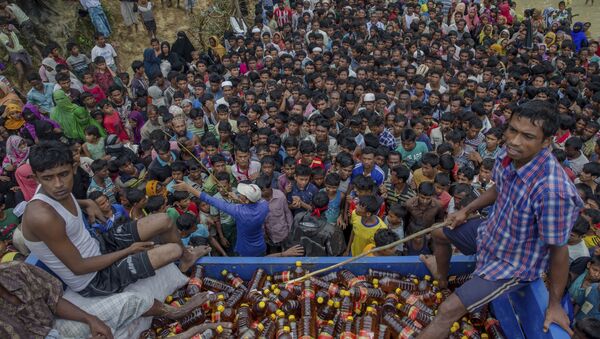Rohingya refugees will return to Myanmar's Rakhine State from neighboring Bangladesh only when Burmese authorities create conditions for destitute returnees, otherwise, they will remain displaced in their own country, Duniya Aslam Khan, United Nations Refugee Agency's (UNHCR) Communication Officer told Radio Sputnik.
"What we see coming out in newspapers… [Rohingya] villages have been burnt, nothing is left," Khan said, "Until and unless conditions are in place for the reintegration of Rohingya back in Rakhine State people may not be able to return."
She emphasized that the refugee crisis is still evolving with people continuing to flee Myanmar's northern region.
Previously, Myanmar authorities signaled their readiness to bring back Rohingya refugees who fled to Bangladesh escaping violent clashes in Rakhine State.
According to Bangladesh's Foreign Minister Abul Hassan Mahmood Ali, the consensus between Dhaka and Naypyidaw on the issue was finally achieved.
"The talks were held in a friendly atmosphere, and Myanmar has made a proposal to take back the Rohingya refugees," Mahmood Ali said as cited by Al Jazeera.
Bangladeshi Prime Minister Sheikh Hasina earlier called for an end to the violence. She also urged to set up safe zones in Myanmar to enable refugees to return.
Speaking to Radio Sputnik, Khan underscored that the number of Rohingya escapees who arrived in Bangladesh in the last a month has already reached 500,000 people, making the ongoing crisis "the biggest refugee emergency of the recent years."
She added that Bangladesh "is already struggling with its own internal problems," citing the fact that the country remains one of the most populated in South Asia.
All in all, Bangladesh is currently hosting about 800,000 asylum seekers from Myanmar, the UNHCR official said, explaining that additional 300,000 Rohingyas had fled to the neighboring country during earlier crises.
"The majority of people…. have arrived [in Bangladesh] with absolutely nothing… Apart from the clothes they were wearing many of them, children particularly were not wearing shoes… Elderly people, disabled people — many of them [were] walking for days to be able to reach safe [haven]," Khan said, adding that some of those who traveled by boat drowned at sea.
The UNHCR official also raised the alarm over the threat of the spread of diseases such as cholera, diarrhea as well as water and airborne illnesses among escapees since most of them are forced to live in crowded conditions.
She pointed out that "the problem is that humanitarian needs are still acute" although all the humanitarian agencies are struggling to provide as much assistance as possible.
"Our reaction and our response should be swift" to prevent the further deterioration of the situation, she warned.
On Tuesday Russian President Vladimir Putin voiced concern over the humanitarian crisis in Myanmar and emphasized the necessity to settle the conflict in a political way.
"The resolution of issues of such a difficult nature… needs to be sought in the sector of political interactions and via political means, without human rights violations," the Russian president pointed out.
The Rohingya crisis erupted on August 25 when Muslim insurgents of Rohingya origin attacked security posts in Myanmar's Rakhine State. The tough response by the country's authorities triggered violent clashes. The century-old conflict has gradually escalated since 2011, hitting its peak in 2012, while another escalation started in 2016.





